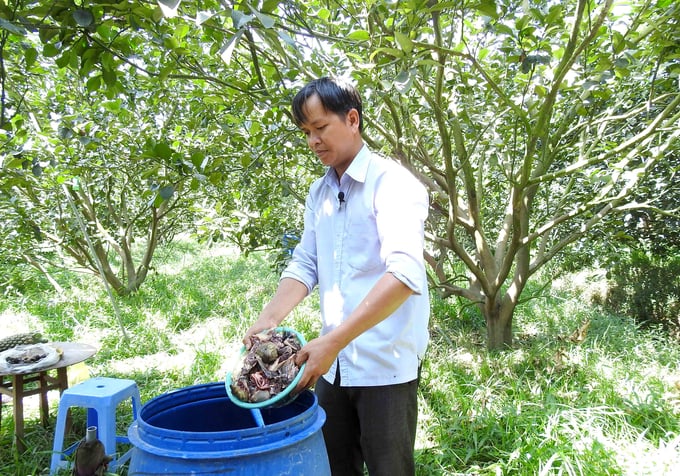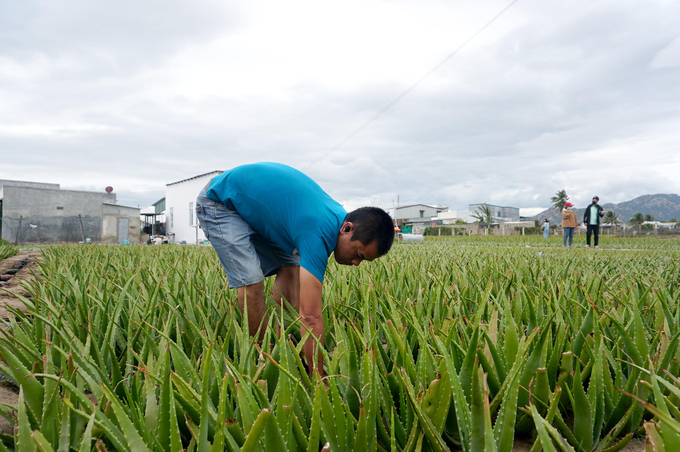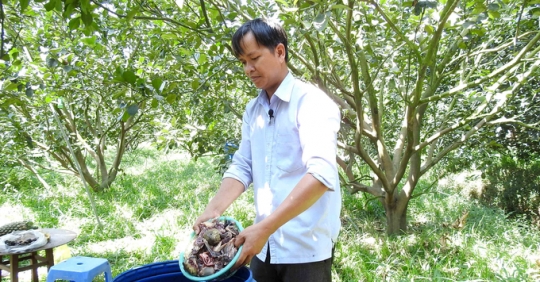[ad_1]
Many agricultural by-products can be used to produce organic fertilizers, but the treatment technology and process have not been widely adopted by farmers.
The source of agricultural by-products in Vietnam today is very large, up to almost 160 million tons/year, a large amount of which can be used as organic fertilizer for plants.
But according to Mr. Nguyen Van Thu, CEO of GC Food Joint Stock Company (GC Food), the treatment of agricultural by-products must be done according to technical standards. Therefore, a high level of knowledge and a passion for research and experimentation is required in every company and operation.

Farmers use composted agricultural waste as organic fertilizer. Picture: son Trang.
For example, GC Food’s Sunshine and Wind Farm has now made their own probiotics to help break down peels, aloe leaves, cow dung… faster and without bad smells. However, GC Food had to experiment for many years, inviting scientists for research and support… to get this probiotic.
According to Mr. Thu, there are now many good articles and clips on social media showing how to ferment and ferment some agricultural by-products. But these methods are still not widely used and still unfamiliar and somewhat confusing for most farmers. Therefore, such programs must be implemented accurately, with operations and formulas that people can easily follow and apply.
Currently, probiotics on the market are generally sold at quite high prices, making it difficult to convince farmers to buy and use them, especially if they are unaware of these types of yeast when they are used to treat waste products that are the result of the Agriculture?
Therefore, to help farmers boldly use the circular economy to promote organic production, the agricultural sector and communities must promote guidelines and have guidelines to support farmers, Mr Thu said. At the same time, set up demonstration sites that people can visit and directly learn how to handle agricultural by-products as organic fertilizer.

GC Food’s aloe vera cultivation area uses a cyclical production process, using by-products of aloe vera production to compost as organic fertilizer. Picture: Nguyen Thuy.
Recently, a number of companies have invested in research into probiotics to treat agricultural by-products with high efficiency, such as reducing decomposition time, creating a source of high-quality organic fertilizer… But these companies can only use probiotics they have researched internally , so the added value is not high, and the scope of these probiotics has not yet been expanded.
Therefore, Mr. Thu suggested that the Ministry of Agriculture and Rural Development, the Ministry of Science and Technology and relevant ministries and branches consider and guide companies that have researched and manufactured probiotics to help treat agricultural by-products to register, sell and circulate these products on the market, thereby contributing to increasing the supply and lowering the price of probiotics on the market.
according to dr Nguyen Cong Thanh, director of the Asia Institute of Organic Agriculture Research and Development, science and technology play a very important role in promoting the application of circular economy in organic production. Science and technology here is a combination of many disciplines such as biotechnology, chemistry, fertilizers, crop protection … and also mechanical engineering. Since the use of organic fertilizer requires a very large amount of fertilizer, it requires machines that help farmers fertilize faster and reduce labor.
In fact, more than 200,000 hectares of rice shrimp in the Mekong Delta is a very suitable place for organic production because of the availability of circulating sources to greatly reduce production costs, but there are still significant difficulties due to the lack of resource mechanization, especially in rice harvesting .
dr Nguyen Cong Thanh also said there is a need to have policies to flesh out and promote the application of circular economy to the development of organic farming.
[ad_2]
Source link

